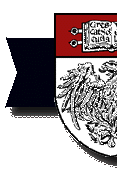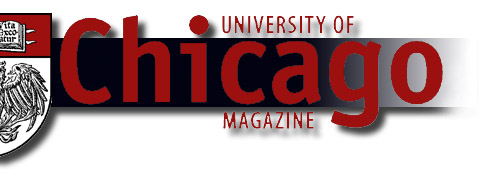 |

The other president—Bill Clinton—addresses
College convocation
At this June’s College convocation, 789 graduates received
congratulations from not one but two presidents—Hugo F. Sonnenschein
and William Jefferson Clinton. It was the third time in University
of Chicago history that the president of the United States had attended
commencement: William McKinley and Theodore Roosevelt received honorary
doctor of laws degrees at their own one-man convocations, the 26th
and 46th.
Clinton, however, did not get a degree and had to share the day.
Elaine Fuchs, the Amgen professor in the departments of molecular
genetics & cell biology and biochemistry & molecular biology,
gave the convocation address. Clinton delivered a half-hour policy
speech on Kosovo and the global economy and met with several students
in a pre-ceremony reception.
Clinton chose to speak at the U of C, Grambling State University,
and the U.S. Air Force Academy this year. After being notified of
his choices, the schools then sent formal letters of invitation.
His visit, announced in April, was greeted with both approval and
reproach. Writing to the University’s student newspapers, some
alumni and students objected to having anyone outside the faculty
speak at convocation, a tradition seldom broken in recent years.
One exception came in 1996 when Washington Post Company executive
and University Life Trustee Katharine Graham, AB’38, joined
Law School professor Cass Sunstein.
As they waited for the 10 a.m. ceremony to begin, many parents
seemed proud that their children’s soon-to-be alma mater was
considered worthy of a presidential visit. “The president of
the most powerful nation on earth is speaking to them as they begin
their lives. It’s marvelous,” said Tamara Jasper. “It’ll
make this a graduation they’ll always remember.” Her daughter,
Surella Seelig, she noted, called her up screaming after the president’s
visit was announced. “She is just thrilled. She is overwhelmed.”
Jean Desormeaux, however, kept the focus squarely on daughter
Marsha. “I saw him in ’92,” he said. “I’m
not looking forward to seeing him. I’m looking forward to seeing
my daughter.”
Ciro De Falco, uncle to Elissa De Falco, felt that Clinton’s
visit was an honor, but noted, “I think it would have facilitated
logistics if he’d stayed in the White House.”
Indeed, having President Clinton on hand added a number of twists
to an already logistically complex occasion. The hot, muggy, and
at times rain-filled day began at 2 a.m. as the required security
forces started to amass: University police, city police, federal
police, FBI agents, and nattily dressed Secret Service agents with
wires running to their earpieces from radios hidden under their
jackets. Many streets near campus were barricaded, watched over
by city police officers. Agents and dogs swept through and closed
the buildings on the main quads.
The quads themselves were sealed with portable metal fences known
as French barricades. Graduates whose last names started with A-D
began lining up at Bartlett Gym at 6:30 a.m. to go through security
procedures similar to those at an airport. To enter the quads, the
graduates’ guests had to pass through metal detectors at 58th
Street and University Avenue, and were discouraged from bringing
umbrellas, bags, wrapped gifts, and other objects that would slow
the process. Still, 90 minutes before the ceremony was scheduled
to begin, the line to get in stretched halfway around the block
to the Administration Building. Once on the quads, guests couldn’t
leave and return or enter any buildings, so the University provided
continental breakfast for 5,000 and set up portable toilets and
sinks on the tennis courts.
Over at 57th Street and Ellis Avenue, several hundred people, including
a few U of C students and many Chicago Serbs, showed up to protest
Clinton’s policies, mainly regarding Kosovo. Kept to a designated
area guarded by mounted Chicago police officers, the protesters
chanted “Stand up to Clinton!” while passers-by gawked.
On the quads, there were smiles, not shouts, as the bagpipers began
the traditional procession. Lining the path through the main quad,
parents held bouquets and camcorders while friends waved. Graduates,
wearing the occasional lei or kente cloth, filed through to their
seats on Harper Quadrangle with the traditional mixture of shyness
and pride. Then came the faculty, at least some of them. For security
reasons, Clinton—wearing a black robe and Yale blue hood—could
not participate in the procession, and some faculty, as well as
President Sonnenschein, the University’s officers, and the
trustees, marched with him from Haskell Hall.
The nondenominational prayer by Alison Boden, dean of Rockefeller
Memorial Chapel, was followed by Elaine Fuchs’s commencement
address, speeches by three students, and presentation of the 1999
Quantrell Awards (see “For the Record”).
Then, as always, the collegiate division masters called the name
of each student as he or she stepped forward to accept his or her
diploma and a handshake from President Sonnenschein. President Clinton
also shook the hand of every student—every student who wanted
to, that is. A handful of graduates ignored Clinton as they crossed
the stage. James Trimarco, an anthropology student who sported dyed
crimson hair and who plans to move to the Czech Republic, said after
the ceremony that he didn’t offer his hand to Clinton because
he “didn’t want to get it all bloody,” referring
to the administration’s actions against Serbia.
Others, including all three of the student speakers, exchanged
friendly greetings with Clinton. “I can see disagreeing with
his views, but I think his office should be respected,” said
student marshal Kamyar Ghaneabassiri, newly possessed of a B.A.
in history and considering graduate school. “That he shook
hands made it [the long wait at Bartlett] worthwhile.”
Clinton’s talk (see sidebar) drew several bouts of applause
and no boos. “We are challenged by your words,” Sonnenschein
told Clinton, noting “that’s a great compliment around
here, and that’s what good teachers do. You are a good teacher.”
Political-science major Amy Traub, who will be getting her Ph.D.
in political science at Columbia, said she was glad Clinton spoke
and added, “I liked what he said, but he could have been working
for it throughout his presidency.” She joined a number of students
wearing a white “Fair trade, not free trade. I signed the pledge”
sticker. Students who signed the pledge vowed not to accept jobs
that would “undermine social and economic justice.”
After the Motet Choir sang the alma mater and Boden offered the
benediction, the pipe band led the recession to 57th Street as Clinton
left in the other direction.
At the outdoor reception on the quads, students partook of champagne,
cranberry juice, cookies, and strawberries and cream while they
hashed over the past few hours and talked about future plans. Student
speaker Michael Rossman, an economics major, had hoped to have an
internship with the National Security Council this summer but didn’t
apply in time. He asked Clinton for a job while shaking his hand.
“Clinton said to try again,” reported Rossman, who’ll
be heading to Deutsche Bank in London this fall. “Having him
here is the greatest thing.”—K.S.
|



